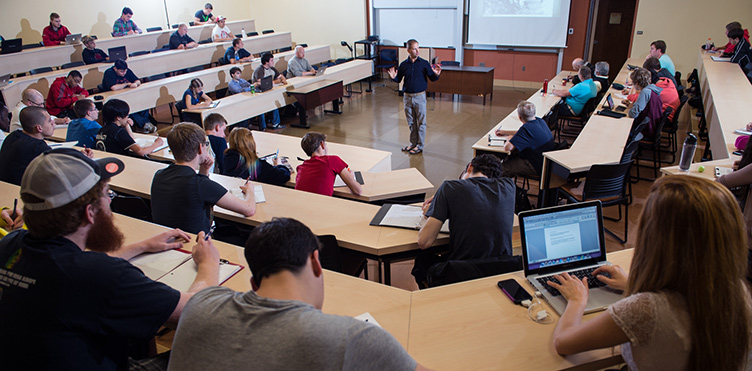Graduate programs

Our MA and PhD programs offer opportunities for advanced study under the guidance of highly respected scholars in a collegial and supportive environment.
Our bi-campus program offers supervision at both the Fredericton campus and Saint John campus and in a wide variety of research fields.
Through collaboration with faculty at other institutions, we can offer a range of co-supervisory options tailored to your needs.
Our students have completed dissertations, theses and reports on a wide variety of subjects. They go on to careers in fields such as academia, law, education and the civil service.
MA Fellowship on Deindustrialization and the Politics of Our Time
The Department of Historical Studies at the University of New Brunswick is accepting applications for a Master of Arts in History Fellowship for a student interested in working on deindustrialization in North America, to begin in September 2026.
MA fellowships are valued at approximately $30,000 over 20 months. These funds may be a combination of scholarships, awards, and teaching and research positions. We assist all our students in applying for Canada Graduate Scholarships from the Social Sciences and Humanities Research Council.
The successful candidate will study under the joint supervision of Dr. Fred Burrill, Department of Historical Studies, and Dr. Peter Thompson, Department of English and Dean of Arts.
The topic is open, but we welcome proposals related to the links between deindustrialization, working-class community and identity, and settler colonialism, as well as proposals related to industrial heritage in deindustrialized areas.
The fellow will become a student affiliate of the Deindustrialization and the Politics of Our Time (DePOT) transnational research partnership, a seven-year initiative bringing together over thirty-five research centres, industrial museums, labour archives, trade unions, and other organizations with scholars across Italy, France, Germany, the U.K., Canada, and the United States.
DePOT examines the political responses to deindustrialization as well as its historical roots and lived experiences.
Candidates should send a brief letter of intent to Dr. Lisa Todd, Director of Graduate Studies: LTodd@unb.ca, and then follow the regular application procedures for an MA in History.
The application deadline is Dec. 15, 2025.
MA Fellowship on Place, Space, and the War Dead in Ancient Greece
The Department of Historical Studies at the University of New Brunswick is accepting applications for a Master of Arts in History Fellowship for a student interested in working on place, space, and the war dead in ancient Greece, to begin in September 2026.
The fellowship is worth $30 000 CAD over twenty months and can be combined with other internal and external sources in accordance with Historical Studies' funding guidelines. The successful candidate will study under the supervision of Dr. Matthew A. Sears, Department of Historical Studies.
The topic is open, but we welcome proposals related to the commemoration of the dead in ancient Greece, particularly the war dead, employing a variety of approaches and sources of evidence, including, but not limited to, archaeological, art historical, epigraphical, and literary.
The fellow will conduct their own research and provide research assistance as part of a five-year SSHRC-funded project entitled “Place, Space, and the War Dead in Early-Iron-Age and Archaic Greece.”
The Department of Historical Studies has several leading scholars working on various aspects of commemoration and memory, from antiquity to the present, and is affiliated with the Gregg Centre for the Study of War and Society, a vibrant home for scholars and students working on many aspects of the histories of war and society, including commemoration and remembrance across periods. In addition to the fellowship, funding is available for research travel to the Mediterranean and for conference travel to present research results.
Candidates should send a brief letter of intent to Dr. Lisa Todd, Director of Graduate Studies: LTodd@unb.ca, and then follow the regular application procedures for an MA in History.
The application deadline is Dec. 15, 2025.
Graduate students
MA students
Grace Chapnik (she/her)

Fields of study: War and Society, 21st Century Canada
Campus: Fredericton
Supervisor: Dr. Cindy Brown
Education: BA Hons. History (Trent)
Thesis title: “Media Coverage of Canada in Afghanistan, 2001-2011”
My thesis examines media coverage of Canada’s involvement in the War in Afghanistan from 2001 to 2011. Specifically, it asks how the media portrayal of the war shaped Canadians’ perception of their nation’s involvement, and whether the depictions of the war in mainstream media were accurate.
What were Canadian civilians shown and told about the war in Afghanistan, and how did these narratives shape their beliefs? Were these narratives true or false? Why did the media present information in the way that it did, and what purpose or agenda did it serve?
Publications:- Co-editor, with P. Whitney Lackenbauer, “It is Necessary that they Should Understand that they are Under the Law”: The Murder Trials of Sinnisiak and Uloqsaq, 1917 (Frost Research Centre, 2023)
- Co-editor, with P. Whitney Lackenbauer, Canada’s First Eastern Arctic Patrol, 1922: First Person Perspectives (Mulroney Institute on Government, 2022)
- “Tainted Love: Gendering Illicit Sex in Early Modern Europe,” The Mirror vol. 42, no. 1 (2022): 119-133
Vivian Lamoureux

Fields of study: Twentieth Century Canada, Public History and Heritage, Cultural History, L.M. Montgomery Studies
Campus: Fredericton
Supervisor: Dr. Heidi MacDonald
Education: BA History MSVU ('25), Minors in Cultural Studies and Political Studies
Thesis title: "The Canadian Nationalist Mythology of Anne of Green Gable (1908)"
My thesis seeks to better understand how Anne of Green Gables has become a myth of Canadian national identity with a particular focus on the establishment of Green Gables Heritage Place and Prince Edward Island National Park.
Highlighting themes of pastoral beauty, selective inclusion, and anti-Americanism, I explore how Anne continues to serve as a nation-building tool over a century after its publication.
Publications:
"From Dunking to a Dead Ball: The Rise and Fall of the Edmonton Grads Through Social Change and World Events." The Mirror: Undergraduate History Journal 45, no. 1 (2025).
Paul Refvik

Fields of study: Modern Germany, Nazism, Communism in Germany
Campus: Fredericton
Supervisor: Dr. Lisa Todd
Education: BA Hons. History (Brandon U)
Working thesis title: “Red Flags Divided: The Communist Party of Germany’s Struggle for Socialism under the Weimar Republic”
My research explores the Communist Party of Germany (KPD) members’, particularly women’s, responses to the KPD’s stance on combating Nazism.
While Stalin’s Comintern leadership doubtlessly influenced the party, how much was “social fascism” policy rigidly enforced from above, and how much did the party’s rank and file support it?
Moreover, to what degree was there cooperation on the ground between members of the KPD, the Social Democratic Party of Germany (SPD), and other Left factions despite Stalinization?
Through my research, I hope to gain a better understanding of the less-amplified voices within the KPD.
PhD students
Michelle Connick (she/her)
Fields of study: Atlantic World History, Social History, Economic History
Campus: Saint John
Supervisors: Dr. Erin Spinney, Dr. Bonnie Huskins
Education: Cert. Disability Management (Dal ’14), BA Bioarcheology (MUN ’18), MA Atlantic Canada Studies (Saint Mary’s ’22)
Dissertation title: “Invisible Economies: The Makeshift Markets of South Shore Nova Scotian Settlements, 1750-1815”
My research explores the makeshift economy in long-eighteenth-century Nova Scotia and how it shifted to accommodate changing demands and societal constraints. I examine economic catalysts, inhibitors, and community implications of a changing economy, exploring underrepresented markets, and the people within them.
This study will focus on historical settlements in Lunenburg, Liverpool, and Shelburne, Nova Scotia. Though the economy of makeshifts is often described as the economy of the poor, destitute, and marginalized, my research defines it as: “an economy of diversified resources” whose market is less visible in the historic record.
Those who worked within that economy may have had multiple sources of income and adopted a variety of survival techniques such as physical migration and occupational changes, supplemental incomes, and criminal and non-criminal activity.
By validating the contributions of those individuals to these communities and their economies, we can reframe the narrative to be one of importance.
Bethany Henderson (she/her)

Fields of study: Atlantic World History, Early Modern and Medieval Europe, Western Religions and Belief Systems
Campus: Saint John
Supervisors: Dr. Cheryl Fury and Dr. Bonnie Huskins
Education: BA History (Vancouver Island University ’20), MA History (Dal ’22)
Working dissertation title: “Pirates and their Pastors: The Role of Execution Sermons in the Atlantic World, 1690-1730”
My research explores how religion, belief, and piety influenced peoples’ internal and external worlds throughout the Anglo-Atlantic World in relation to piracy.
I principally work with seventeenth- and eighteenth-century pirate execution sermon accounts in the British Isles and Atlantic colonies to examine how people interpreted piracy through a literary framework.
Religious leaders across the western world published Biblical discourses in conjunction with pirate execution spectacles to spread moralism, which developed into its own distinct genre purposed to rival earlier depictions of pirates as English patriots.
My work analyzes ministers’ moralistic crusades to demonize piracy through their brand of popular media and examines how these accounts affected public opinion.
Publications:
- “Blue Light Evangelicals in the Late Eighteenth-Century Royal Navy,” “Waldensians,” “Methodism (Wesleyanism)”, “Puritans,” and “Moriscos,” in The Database of Religious History (2024).
- Book review of Frances Barkley, Eighteenth-century Seafarer by Cathy Converse, in The Northern Mariner/Le marin du nord 33, nos. 3 and 4 (June 2024): 499-501.
Chris Gismondi
Fields of study: Canadian slavery, American north, Transatlantic Slavery, women and gender history, abolition and amelioration, settler colonialism, material culture/art history
Campus: Fredericton
Supervisors: Dr. Stefanie Hunt-Kennedy, Dr. Charmaine A. Nelson
Education: BA Hon. McGill 2017, MA Concordia 2019.
Working dissertation title: “Gender, Family, and Gradual Abolition in Upper Canada and Northern Slavery, 1760-1833”
My project unpacks the uniqueness of northern slavery and resistance in Upper Canada examining the impact of Loyalist slavery expansion on enslaved family life through a gendered and feminist perspective using a comparative analysis with other slave-minority demographic sites.
Combining art historical and historical approaches, I examine Upper Canada slavery through traditional written and printed archives alongside visual art and material culture. Through a focus on reproduction, family, and defiance, I extend the study of slave resistance to northern slavery where bondspeople engaged in unique forms of resistance in quotidian ways.
Debunking the myth of northern slavery as benevolent, I examine how gender and family were exploited throughout northern slavery and the age of abolition specifically via gradual emancipation laws. To wean Upper Canada from slavery, enslaved women’s reproduction after 1793 was legislated not to produce enslaved “chattel” children, but indentured servants bound to the same enslaver until the age of 25.
This dissertation disputes generations of scholars of northern slavery who have dismissively characterized children and pregnancy as unwanted “drains” on the economic viability of relatively smaller slave estates. Yet enslaved women’s reproductive potential via indentured children was legislated as the transitional process to freedom. This challenges our understanding of women and children in northern, slave minority-demographic spaces during the age of gradual abolition.
Publications
“‘PEGGY, not having his permission to absent herself from his service’: Enslaved Black Women’s Resistance and Defiance in Upper Canada Slavery” in Nah! On the Possibilities of Ongoing Refusals, Black Canadian Studies special issue of Journal of Canadian Studies eds. Janelle Joseph and Sephanie Latty, University of Toronto Press, 2024.
“Unravelling Slave Sites in Europe: Reconsidering Europe as a Temperate, Slave Minority Site and African-Diasporic Space, Through Counter-Commemoration” in Iconographies of Oppression?: Revisiting Europe and Africa’s Shared History Through Artifacts and Commemorations, edited by Maro Zoppi, 2024.
Book review
Reckoning with Slavery: Gender, Kinship, and Capitalism in the Early Black Atlantic, Jennifer L. Morgan in Slavery & Abolition, 2024.
Graham Nickerson (he/him)

Fields of study: Black Loyalist History, Black Atlantic History
Campus: Fredericton
Supervisor: Dr. Stefanie Hunt-Kennedy
Education: BSc (St. Mary’s), MScEng (UNB), MA History (UNB)
Working dissertation title: “‘To Be Made Majesties Of...:’ Black Loyalist Agency in the Maritime Provinces”
This study examines Black Loyalist society by investigating vital statistics, church records, and oral histories to demonstrate the diversity of Black Loyalist society rather than viewing them as a cultural monolith.
I argue that Black Loyalism, the settlement in Sierra Leone, and the No. 2 Construction Battalion reflect a spectrum of Black Loyalist aspirations, from high concepts of loyalty to Britain to more practical motives of avoiding imprisonment.
Preliminary oral histories reveal internal rifts and a hierarchy of colorism within Black communities, as exemplified by racially mixed Barbadian Stephen Blucke’s leadership in Birchtown.
Understanding these dynamics sheds light on the mobility of Black Loyalists and the rise and fall of their communities within broader White society.
Spencer Paddock (he/him)
Fields of study: Imperial History, War and Society, Modern Germany
Campus: Fredericton
Supervisor: Dr. Lisa Todd
Education: BA Hons. Psychology and Classics (U of Winnipeg ’21), MA History (UNB ’23)
Working dissertation title: “Defending Germany: Right-Wing Political Violence in an Imposed Decolonial Space, 1919-1925”
My project examines the street violence that occurred during the early years of the Weimar Republic between right-wing, pro-imperial militia groups like the Freikorps and left-wing, anti-imperial groups.
Using memoirs, police reports, newspapers, and military files, it analyses the motivations of officers and lower ranked militia personnel who were most often responsible for inflicting the political, racial, and gendered violence of the day.
My study contextualizes the violence of this period in Germany’s colonial past and the collapse of its colonial empire at the end of the First World War, as well as global trends of anti-left activity and anti-Bolshevik fear across the British Empire in places like Canada, Australia, and Ireland.
Publications:
- “Pandora’s Box: The Legacy of Iraq in Ukraine,” Intersections 5, no. 2 (2022): 21.
Robert Smol

Fields of study: First World War, Canadian History, History of Medicine
Campus: Fredericton
Supervisor: Dr. Lee Windsor
Education: BA (McGill), BEd (Queen’s), MA (RMC)
Dissertation title: “Public Health Science Innovations and Their Application Within the Sanitary Operations of the Canadian Army Medical Corps During the Great War, 1914-1919”
The Great War along the Western Front and in Russia saw a substantial decline in the percentage of fatalities due to disease.
My research focuses on the disease-control units (Sanitary Sections and Mobile Laboratories) that were mobilized as part of the Canadian Expeditionary Force beginning in 1915 as well as for the Canadian contingents deployed to Russia in 1918-19.
These units were the military end-product of over fifty years of scientific discovery and innovation in the microbial origin and spread of disease. By 1914 innovations in public health were fully incorporated within the Canadian Army’s operational doctrine.
The study will focus on the operational tasks assigned to these units along the Western Front as well as within the Army’s hospitals, barracks and billets. These tasks included, but were not limited to, the construction and organization of water purification and septic systems as well as decontamination and quarantine measures.
Publications:
- Book Review of Among the Walking Wounded: Soldiers, Survival and PTSD by John Conrad, in Canadian Military History 32, no. 1 (2023).
- “Making Waves; Remembering Prime Minister Kim Campbell’s Lonely Losing Battle to Replace the Sea Kings,” Canadian Naval Review 14, No 3 (2019).
PhD candidates
Delaney Beck (she/her)

Fields of study: Gender, History of Medicine, History of Nursing, Military History
Campus: Fredericton
Supervisor: Dr. Cindy Brown and Dr. Erin Spinney (UNBSJ) co-supervisor
Education: BA Hons. History (UNB '20), MA History (SMU '21)
Dissertation title: “‘Some of the sisters have shell shock as well as wounds’: War Trauma in First World War Canadian Nursing Sisters”
My research examines First World War Canadian Nursing Sisters and their experiences with war trauma, such as shell shock, their treatment, and the perception of their illness by other officers, their families, and wider society.
Through their personnel and medical files, and other written accounts, my thesis pieces together their wartime service, the conditions they faced, and the steps they took to recover.
These women were also officers in the military, a rank which had never been granted to women before, and which greatly influenced the view of the military and physicians of their illness, along with their gender.
The women’s view of their or other women’s trauma is more difficult to trace. The experiences of these women add a new element to the study of class, gender, mental health and trauma that, until recently, has been largely focused on men, thus contributing to a greater understanding of the consequences of war.
J. Watkins Coady
Fields of study: Microhistory, History From Below, Oral History, Family and Women's History, Migration History, Convicts and Penal Colonies, Postcapitalist Futures
Campus: Fredericton
Supervisors: Dr. Angela Tozer (UNBF); Dr. Erin Spinney (UNBSJ)
Education: BA Political Science (StFX); MA History (Concordia)
Broadly speaking, my work documents how disparate groups of people survive and attempt to build viable societies together in liminal, anomalous, and non- or quasi-legal spaces. In as much as it can be called history, it points up the limitations of the discipline and the prescriptive social sciences with which it is associated and from which it borrows (e.g., law, economics, political science, criminology).
Despite their specialization and functional differentiation, these disciplines still turn, in large part, on a narrow set of methods and assumptions developed in the nineteenth century. Particularity, incommensurability, non-synchronicity, and contingency - not systematic comparisons of pre-selected criteria along axes of similarity and difference, pace John Stuart Mill - are the starting points for any serious socio-historical study of the early modern era that does not wish to presume capitalism.
My dissertation is closely tied to the Gulf Ecologies Project. It seeks to understand how, circa 1500 to about 1890, persisting, permanent, and unsponsored settlements in the Gulf of St. Lawrence survived during the winter, when European extractors effectively abandoned the region.
I focus on the period after 1763, when the British sought to bring pre-existing settlements within the pale of uniform law and jurisdiction(s). The first part of the dissertation employs social history techniques to uncover seasonal labour practices, migrations, and life cycle histories. The second, which builds on the data unearthed in the first, undertakes an oral environmental history of the Bras D'Or Lake, an important hub for transfrontier labourers operating out of the greater Gulf.
Connor E. R. DeMerchant (he/him)

Fields of study: Caribbean History, British Empire, Poverty, Migration Studies
Campus: Fredericton
Supervisor: Dr. Stefanie Hunt-Kennedy
Education: BA Hons. History and English (UNB ’19), MA History (Queen’s ’21)
Dissertation title: “Making Whiteness, Remaking Empire: The Poor Whites of Dorsetshire Hill, St. Vincent, 1834-1940”
Making Whiteness, Remaking Empire traces the history of the poor whites of Barbados within the post-emancipation period with a focus on Governor Francis Hincks’s proposed scheme in 1859 to relocate the poor whites of Barbados to other islands in the Caribbean.
The dissertation argues that the racialization of poverty and state formation are key to understanding the “poor white problem” and the migration schemes of the nineteenth century within the British Empire.
An examination of Hincks’s resettlement plan will demonstrate how, within the context of slavery emancipation, the poor whites, who colonial administrators had seen as an undesired labour force in the British Caribbean for over a century were seen, suddenly became necessary subjects of poor relief because of their whiteness.
Even without government aid, the resettlement plan became a reality with the establishment of a distinct community of poor whites at Dorsetshire Hill on St. Vincent.
Publications:
- Friars, Rachel M. and Connor E. R. DeMerchant. “Neo-Victorian Queen Victoria,” The Palgrave Handbook of Neo-Victorian Studies, eds. Sarah E. Maier and Brenda Ayres (Palgrave Macmillan, 2023).
- “Venerating Verses and Disrespectful Ditties: Informal Music Inspired by Queen Victoria,” The Journal of Victorian Culture Online (Sept 2021).
- Book Review of The Right to Rule and the Rights of Women: Queen Victoria and the Women’s Movement by Arianne Chernock, in Royal Studies Journal (June 2022).
Charles Ferris
Fields of study: Military History, Atlantic World History
Campus: Fredericton
Supervisors: Dr. Lee Windsor (UNBF) and Dr. Roger Sarty (WLU)
Education: BA (Hons.), MA, LLB
Working dissertation title: “Douglas Hazen and the Business of Empires at War”
Jay L. Lalonde (they/them)

Fields of study: Settler Colonialism, Canadian History, Migration and Transnationalism, Scandinavian History
Campus: Fredericton
Supervisor: Dr. Angela Tozer
Education: BA (Hons.) English and Norwegian, BA Icelandic (U of Iceland ’20), MA Inter-American Studies (U of Iceland ’20), Dipl. Translation Studies (U of Iceland ’21)
Working dissertation title: “Model Settlers, Dirty Foreigners, and Colonial Agents: Icelandic Settlers in Nova Scotia & Atlantic Canada’s Immigration Policy, 1867-1914”
My dissertation examines “Markland,” a short-lived Icelandic settlement in Nova Scotia (1875-1882). Focusing on lives and journeys of the Markland settlers, my project examines developments in post-Confederation immigration policy as well as larger questions about whiteness, mobility, and the roles of non-British settlers in the British Empire.
Immediately after Confederation, Canada encouraged bloc settlements of various European settlers as a convenient way to fulfill its settler colonial objectives. Aided by federal subsidies, both Nova Scotia and New Brunswick initially supported new agrarian settlements, but stopped by the mid-1870s.
This seems to have been partly caused by unrealistic expectations of the settlers’ self-reliance and by refocusing the Dominion’s immigration infrastructure: no more immigration conferences, no more subsidies, and Prairie settlement was now a priority.
By the early 1880s, Canada’s policy discourse was much more uniform in encouraging British settlers first and foremost, and the Maritime provinces never supported another bloc settlement.
Publications:
- “‘...There Is a Strong Leaven of the Old Norse Blood in Nearly All of Us:’ Settler Colonialism and the Vínland Mythology on the East Coast of North America,” in Colonial Entanglements and the Medieval Nordic World, eds. Cordelia Heß, Solveig Marie Wang, and Erik Wolf (DeGruyter, Dec. 2024)
- “The Search for a Promised Land: Three Settlement Plans, Three Agents, and Three Handbooks for Icelandic Migrant-Settlers from 1875,” Settler Colonial Studies 14, no. 3 (2024): 1-27.
- “‘An Icelandic Driver’: J. Magnús Bjarnason’s Story as a History of Immigrant Hierarchy, Erasure, and Antisemitism in Nineteenth-Century Halifax: An Introduction and Translation.” Scandinavian-Canadian Studies / Études scandinaves au Canada 30 (2023).
Laura Oland (she/her)

Fields of study: Art History, Tudor History, Dress History, Women’s History, Museum Studies, Atlantic Canadian History
Campus: Saint John
Supervisors: Dr. Heidi MacDonald (Saint John), Dr. Erin Morton (StFX)
Education: Bachelor of Arts (Honours) History Minor in Classics from Acadia University, Master of Letters Art History: Dress & Textiles University of Glasgow
Working dissertation title:Alice Lusk Webster, The Woman Who Brought the World to New Brunswick: An Exploration of the Development of the New Brunswick Museum’s Art Department
My research explores the overlooked contributions of Alice Lusk Webster (1880–1953) to the New Brunswick Museum, Canada’s oldest museum, and her role as a pioneering woman in the museum industry.
As the founder of its art department in 1934 and an honorary curator, Lusk Webster was instrumental in the museum's 20th-century success. Her accomplishments include founding Canada’s first children’s museum, creating educational programs, and supporting local New Brunswick artists.
Despite her significant impact, her work remained unpaid, and the museum’s all-male board neither funded her initiatives nor fully embraced her vision for integrating art into the museum.
Andy Post (he/him)

Fields of study: Indigenous and colonial histories of early modern Newfoundland and Labrador/the “Greater Gulf”/Northeast/North America
Campus: Fredericton
Supervisors: Dr. Sasha Mullally and Dr. Nicole O’Byrne (UNB Law)
Education: BA English (U of Arizona, ’11), MA English (Dal, ’14), MA History (MUN ’19)
Working dissertation title: “With whom we are connected”: Indigenous Nations, New France, and British Colonial Policy-Formation in Newfoundland and Labrador to 1833
During the long eighteenth century, British imperial policy came to regard Newfoundland and Labrador as increasingly specialised fishing and fur-trading zones, where settlers’ ability to own land as property was severely restricted.
Within these zones, “encouraging the fishery” was the legal ideology governing English Newfoundland’s expansion into Beothuk, Mi’kmaw, Innu, and Inuit territory. Unlike New France or New England, however, before the 1760s “England’s oldest colony” had no experience conducting formal, peaceful relations with Indigenous peoples.
But the emergence of St. John’s from apparent isolation is misleading. Since the sixteenth century the English in Newfoundland had been surrounded by Beothuk, Mi’kmaq, Innu, Inuit, and French fishermen, fur-traders, and colonists.
My dissertation traces the evolution of colonial policy towards Indigenous peoples in Newfoundland and Labrador from uncertain beginnings, anti-French paranoia, and postwar policy-formation to the more confident attitudes galvanized by the rise of “the Colony” in the early nineteenth century.
Bradley Shoebottom

Fields of study: First World War, Canadian History, Science and Technology
Campus: Fredericton
Supervisor: Dr. Lee Windsor
Education: BA International Relations (U of Windsor ’92), MA War Studies (RMC ’97), MA History (UNB ’99)
Dissertation title: “Beans, Bullets, and Bridges: Logistic Operations and Mobility in the Canadian Corps, 1914-1918”
My research examines the new concept of combat support services required to feed, clothe, provide ammunition, and transport armies in the transitional era of horse drawn wagons and early motor transport during the First World War.
I argue that this innovation in support services enabled the Canadian Corps to be more successful in battle than the other British Corps. Without effective logistic and engineer support, it would have been impossible to maintain offensives much beyond a day.
Further, this support service expertise became so well practiced, that in the Final Hundred Days of the war, the Canadian Corps was able to plan, prepare, and execute new attacks on a weekly basis compared to the six-week time frame needed in 1917.
This enhanced combined service support became a hallmark of the Canadian Army operations that continues to this day.
Publications:
- “Vital Links: Roads and Light Railways in the Military Operations of the Canadian Corps during the First World War,” Scientia Canadensis 45, no. 1 (2023): 91-110.
- “The First World War and the Homefront in Canada: Broadening the Analysis,” Acadiensis 50, no. 1 (Spring 2021): 149-162.
- “The Shipbuilding Career of Gaius S. Turner of Harvey Bank, NB, 1874-1892,” The Northern Mariner 10, no. 3 (July 2000): 15-48.
Sandi Stewart (she/her)

Fields of study: Atlantic World History, Public History, Indigenous History, Material Culture
Campus: Saint John
Supervisors: Dr. Erin Spinney (UNBSJ) & Dr. Erin Morton (StFX)
Education: BA Folklore and English (MUN), MA Folklore (MUN)
Working dissertation title: "Challenging Gender Divides between Public and Private Spaces: Showcasing Women's Labour from the Atlantic World at Public Exhibitions, 1850-1930"
Publications:
- “Archive,” Edward Elgar Encyclopedia of Historical Organization Studies [forthcoming Oct 2025].
- “Letters home written by Private Innes F. Munro,” Intersections 7, no. 1 (2024): 24-25.
- Book review of Folk Masters: A Portrait of America by Barry Bergey and Tom Pich in Material Culture Review 86 (2017).
Zachary A. Tingley (he/him)

Fields of study: Atlantic World History, Canadian History, Environmental History, Maritime History
Campus: Saint John
Supervisors: Dr. Erin Spinney (UNBSJ) & Dr. Joshua MacFadyen (UPEI)
Education: BA Hons. History (STU ’15), MA History (UNB ’17)
Dissertation title: “Navigating a Marine Commons: The Gulf of St. Lawrence and the Challenges of Maritime Safety, 1815-1867”
“Navigating a Marine Commons” explores the intersections of environment, governance, and navigational safety in the Gulf of St. Lawrence to better understand the complex regulatory and financing arrangements that were put in place between the 1810s through the 1860s.
These measures were taken, in part, to alleviate the perceived crisis of shipwrecks, loss of human life, and valuable cargo. In the Gulf, these challenges to safe navigation were typically shared and resulted in questions of jurisdiction. For example: Whose responsibility was it to pay for the infrastructure to save lives in areas with little to no human population?
The goal of this dissertation project is to offer a new conceptual framework into which seemingly unconnected pieces of historical evidence can be joined together by focusing on marine and littoral spaces as spaces of both transition and intersection.
Publications:
- Zachary A. Tingley and Elizabeth Mancke, “Intercolonial Cooperation and the Building of St. Paul and Scatarie Island Lighthouses, 1826-2840,” Acadiensis 51, no. 2 (2022): 60-90.
Additional information about our programs is available in our graduate program handbook. For further information, you can contact the director of graduate studies and the graduate administrative assistant.
